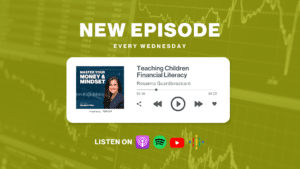
Taxes, personal and family budgets, savings, and investments are all things every adult will face in their lifetime. However, not much, if any of these topics are covered in most high school’s standard curriculum.
The U.S. Bureau of Labor Statistics reports that in October 2020, 62.7% of high school graduates were enrolled in colleges or universities That leaves 37.3% of students likely to enter the workforce upon graduation. Just because a large percentage of high school students transition into higher education doesn’t mean they will have a leg up on their classmates that chose not to enroll.
Personal finance education is lacking in many college programs. This puts new diploma holders in the same situation as their high school classmates four years prior. Unfortunately, the importance for most young people to have a baseline knowledge of personal finance isn’t realized until it’s too late.
Supporting Evidence to Teaching High Schoolers Personal Finance
The Vast World of Banking
Paper paychecks are a thing of the past. Employers offer new hires the option for direct deposit in their bank account. Or a pre-paid debit card, which is a bank account with limited options. It’s important for young adults to learn about the banking industry before they enter the workforce. Setting up a bank account can be a daunting task. Especially if you have no knowledge of the process or the correct information needed to apply for one.
Your Credit Score
The significance of their credit score and the consequences of damaging their credit report should be taught to every high school student. Most young adults receiving their first credit card will open the envelope, see the card’s limit, and immediately look to spend. They won’t consider the interest rate. They won’t understand how a small purchase spread out over several months of payments could end up costing them double.
Also, they may not understand the importance of making monthly payments. How missing a payment could negatively affect your credit report. The far-reaching effects of a bad credit report could prove problematic. Especially, when it comes time to buy their first car, obtain a lease on an apartment, or even secure a mortgage on their first home.
Lack of Personal Finance Education at Home
A survey conducted by Chase Bank revealed that 70% of parents in the U.S. teach their kids the basics of personal finance, leaving 30% of families potentially not discussing these principles. That 30% represents around 100 million people, creating a large selection of Americans with limited financial education.
Lack of Student Loan Knowledge
Many graduating high school students will need to finance their college education. Unfortunately, these students are offered little information about their finances. No one explains the importance of knowing what an acceptable amount of debt is for their degree. Or whether their area of study will supply enough income to justify the expense. This could lead to college graduates paying for their education for many years after receiving their diploma.
Increased knowledge of personal finance can lead to smarter financial behavior. Teaching basic banking principles to high school students could be the difference between a financial headache and financial success.
Editor’s Note:
Florida just became the largest state to require financial literacy education in high school. With 26 other states having personal finance bills pending, the future of financial literacy for children is bright. CNBC Article



